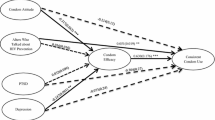Abstract
Background: Interracial relationships in Canada have increased over the years. However, little research has focused on comparing STI/HIV risk and condom use between those in intra- and interracial relationships, specifically among Middle Eastern-Canadians. Methods: A web-based survey was administered to Middle Eastern-Canadians. Logistic regression analysis was used to assess factors associated with consistent condom use. Analyses were stratified by partner’s race (Middle Eastern or non-Middle Eastern). Results: The analysis sub-sample consisted of 92 participants. Factors associated with consistent condom use varied between the stratified groups. Among those with Middle Eastern partners, attitude towards marriage and the family and control in the relationship were associated with condom use. Among participants with non-Middle Eastern partners, acculturation and HIV knowledge were found to be associated with condom use. Discussion: Factors associated with condom use varied between Middle Eastern-Canadians in intra- and interracial relationships. These differences illustrate the need for tailored interventions aimed at increasing condom use among this racial group.
Similar content being viewed by others
References
Statistics Canada. Ethnic diversity survey: portrait of a multicultural society. Ottawa: Statistics Canada; 2003.
Milan A, Hamm B. Mixed unions. Can Soc Trends. 2004;(73):2–6.
Aral SO, Hughes JP, Stoner B, Whittington W, Handsfield HH, Anderson RM, et al. Sexual mixing patterns in the spread of gonococcal and chlamydial infections. Am J Public Health. 1999;89(6):825–33.
PHAC. HIV and AIDS in Canada: surveillance report to June 30, 2006. Ottawa: Surveillance and Risk Assessment Division, Center for Infectious Disease Prevention and Control, Public Health Agency of Canada (PHAC); 2006.
Busulwa R, Takiyaddin MY, Azzubeidi AA, El Zein El Mousaad H, Tawillah J, et al. Perceptions of the condom as a method of HIV prevention in Yemen. East Mediterr Health J. 2006;12(Suppl 2):S64–77.
Chemtob D, Damelin B, Bessudo-Manor N, Hassman R, Amikam Y, et al. “Getting AIDS: not in my back yard.” Results from a national knowledge, attitudes and practices survey. Isr Med Assoc J. 2006;8(9):610–4.
Kabbash IA, El-Sayed NM, Al-Nawawy AN, Shady IK, Abou Zeid MS. Condom use among males (15–49 years) in Lower Egypt: knowledge, attitudes and patterns of use. East Mediterr Health J. 2007;13(6):1405–16.
Todd CS, Barbera-Lainez Y, Doocy SC, Ahmadzai A, Delawar FM, et al. Prevalence of human immunodeficiency virus infection, risk behavior, and HIV knowledge among tuberculosis patients in Afghanistan. Sex Transm Dis. 2007;34(11):878–82.
Evans BA, Kell PD, Bond RA, MacRae KD. Racial origin, sexual lifestyle, and genital infection among women attending a genitourinary medicine clinic in London (1992). Sex Transm Infect. 1998;74(1):45–9.
Laumann EO, Youm Y. Racial/ethnic group differences in the prevalence of sexually transmitted diseases in the United States: a network explanation. Sex Transm Dis. 1999;26(5):250–61.
Wingood GM, DiClemente RJ. Application of the theory of gender and power to examine HIV-related exposures, risk factors, and effective interventions for women. Health Educ Behav. 2000;27(5):539–65.
Statistics Canada. Low-income cut-offs for 2005 and low income measures for 2004. Ottawa: Statistics Canada; 2006.
Loue S, Cooper M, Traore F, Fiedler J. Locus of control and HIV risk among a sample of Mexican and Puerto Rican women. J Immigr Health. 2004;6(4):155–65.
Devos-Comby L, McCarthy D, Ferris H, Salovey P. Integrated theory of reasoned action predicts later condom use among low-income inner-city women. Presented at CIRA AIDS Science Day, Yale University; 2002.
Whooley MA, Avins AL, Miranda J, Browner WS. Case-finding instruments for depression. Two questions are as good as many. J Gen Intern Med. 1997;12(7):439–45.
Takahashi M, Tanaka K, Miyaoka H. Reliability and validity of communication skills questionnaire (CSQ). Psychiatry Clin Neurosci. 2006;60(2):211–8.
O’Leary A, Goodhart F, Jemmott LS, Boccher-Lattimore D. Predictors of safer sex on the college campus: a social cognitive theory analysis. J Am Coll Health. 1992;40(6):254–63.
Sherman SG, Gielen AC, McDonnell KA. Power and attitudes in relationships (PAIR) among a sample of low-income, African-American women: implications for HIV/AIDS prevention. Sex Roles. 2000;42(3–4):283–94.
Caron SL, Davis CM, Halteman WA, Stickle M. Predictors of condom-related behaviors among first-year college students. J Sex Res. 1993;30(3):252–9.
Hojat M, Shapurian R, Foroughi D, Nayerahmadi H, Farzaneh M, Shafieyan M, et al. Gender differences in traditional attitudes toward marriage and the family. J Fam Issues. 2000;21(4):419–34.
Sikkema KJ, Heckman TG, Kelly JA, Anderson ES, Winett RA, Solomon LJ, et al. HIV risk behaviors among women living in low-income, inner-city housing developments. Am J Public Health. 1996;86(8):1123–8.
Delaney ME, Langille DB, Richardson HRL, Beazley RP. Factors influencing condom use among students attending high school in Nova Scotia. Can J Hum Sex. 1997;6(3):185–96.
SAS Institute I. SAS user’s guide: statistics, version 9.1.3 edition. Cary, NC: SAS Institute, Inc.; 2006.
Gordis L. Epidemiology: updated edition. 3rd ed. Philadelphia: Elsevier Saunders; 2004.
Cooper TV, DeBon M, Haddock CK, Esquivel DR, Klesges RC, Lando H, et al. Demographics and risky lifestyle behaviors associated with willingness to risk sexually transmitted infection in Air Force recruits. Am J Health Promot. 2008;22(3):164–7.
Novak DP, Karlsson RB. Gender differed factors affecting male condom use. A population-based study of 18-year-old Swedish adolescents. Int J Adolesc Med Health. 2005;17(4):379–90.
Mmbaga EJ, Leyna GH, Mnyika KS, Klepp KI. Knowledge of sexually transmitted infections complications strongly predict risky sexual behaviours and HIV serostatus: results from rural Kilimanjaro, Tanzania. Sex Transm Infect. 2008;84(3):224–6.
Knipper E, Rhodes SD, Lindstrom K, Bloom FR, Leichliter JS, Montano J. Condom use among heterosexual immigrant Latino men in the southeastern United States. AIDS Educ Prev. 2007;19(5):436–47.
James CA, Lima MD, Hart TA, Roberts KE, Ghai A. Demographic predictors of unprotected vaginal intercourse (UVI) in university students: the importance of religion. Poster presented at the 17th annual Canadian conference on HIV/AIDS research. Montreal, Canada; 2008.
Acknowledgments
This research was funded by the University of Waterloo/Social Science and Humanities Research Council (UW/SSHRC) Institutional Grant.
Author information
Authors and Affiliations
Corresponding author
Rights and permissions
About this article
Cite this article
Schoueri, N., Bullock, S.L. & Dubin, J.A. Racial Sexual Mixing and Factors Associated with Condom Use Among Middle Eastern-Canadians. J Immigrant Minority Health 12, 68–73 (2010). https://doi.org/10.1007/s10903-009-9232-0
Received:
Accepted:
Published:
Issue Date:
DOI: https://doi.org/10.1007/s10903-009-9232-0



